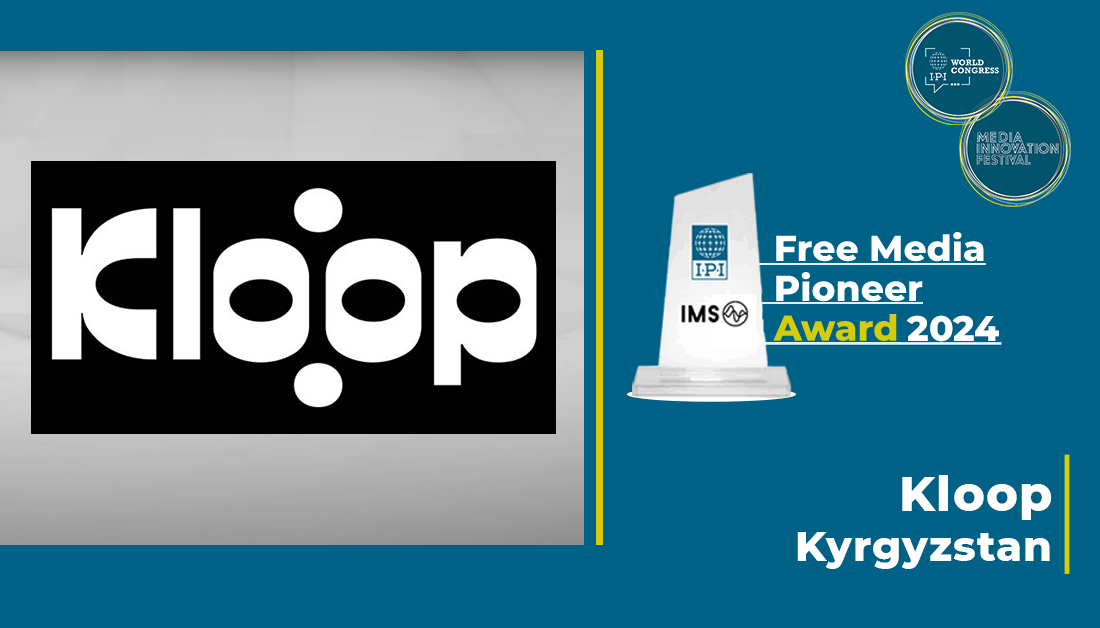The Kyrgyz independent news outlet Kloop – a pioneer of brave and uncompromising investigative journalism in Central Asia – is the recipient of the 2024 IPI-IMS Free Media Pioneer award.
The award honours Kloop’s fearless accountability journalism and dedication to fostering quality media and democratic ideals in Kyrgyzstan for nearly two decades. It also recognizes Kloop’s resilience and commitment to its vital watchdog mission despite the Kyrgyz government’s crackdown on independent media – including an ongoing effort to shut Kloop down.
The Free Media Pioneer award is presented annually to organizations meeting the demands of the moment through innovative models of journalism, media, or press freedom defence. They are opening up new ways of thinking about the free flow of information to strengthen independent journalism and meet the needs of their communities. This year, 11 organizations globally were shortlisted for the Free Media Pioneer award.
This year’s Free Media Pioneer award will be presented together with the IPI-IMS World Press Freedom Hero Award at a special ceremony at the 2024 IPI World Congress in Sarajevo on May 23.
A pioneer of brave and uncompromising investigative journalism in Central Asia
Founded in 2006, Kloop has grown into one of the most popular independent news sources in Kyrgyzstan, specializing in exposing endemic, high-level corruption. Its reporting frequently sheds light on the corrupt nature of power in Kyrgyzstan, dominated by powerful alliances among public officials, security forces, and oligarchs.
Among other stories, it uncovered a joint effort by Kyrgyz MPs, security forces, and high-level civil servants to enforce a monopoly in the country’s coal-mining industry; revealed that a prosecutor had appropriated for himself funds confiscated from a bank engaged in illegal activities; and investigated possible corruption related to the construction of a football academy in the country’s south with links to the country’s political and security elite as well as the Russian state atomic energy company Rosatom.
Kloop often focuses on stories that affect the public’s basic needs, such as corruption in thermal power stations, the electricity industry, or water resource management, among other topics. “Corruption harms people of Kyrgyzstan in the most direct way possible. It literally deprives people of light, warmth, water, and other basic necessities”, Kloop co-founder Rinat Tuhvatshin said in an interview earlier this year.
Its data-savvy team uses innovative techniques to carry out Kloop’s watchdog mission. It has employed internally built algorithms, for example, to scan public data such as procurement documents and tax declarations for patterns of possible corruption.
Upholding democracy
Kloop’s work extends to activities supporting the future of quality media in the country and upholding democracy. Its journalism school aims to support the next generation of journalists, including training journalists from remote areas of the country, bridging the gap between urban and rural regions. Meanwhile, Kloop’s wider structures extend beyond the world of media: notably, the organization has trained more than 10,000 election observers using software developed in-house, supporting the monitoring of five elections in the country. Its software for election monitoring has been used by international election observers in Poland, Hungary, Bosnia and Herzegovina, North Macedonia, and Zimbabwe. Meanwhile, Kloop’s new journalism hub in Warsaw aims to support journalists from Central Asia in exile or under pressure.
Increasing pressure from authorities in a worrying regional context
Kloop’s uncompromising public-interest journalism, combined with its courageous refusal to bow to various forms of threats or ploys to soften its coverage, have earned it the government’s ire. In August 2023, prosecutors filed a case to force Kloop’s closure over its “negative” reporting which they claimed had “discredited” the authorities and created “instability”. Prosecutors also absurdly blamed the outlet for challenges Kyrgyzstan faces, including economic hardship and unrest in the country’s Batken region near Tajikistan.
In February, a district court ordered Kloop to be shut down. Last week, the Bishkek City Court refused Kloop’s appeal, meaning that the outlet is threatened with impending closure.
In September 2023, Kyrgyzstan blocked access to Kloop’s website following a request by the State Committee of National Security. The security services objected to an article reporting claims by a Kyrgyz opposition politician who alleged that he had been tortured while in prison. Despite a recent court decision in favor of Kloop, the outlet’s website remains blocked, even if the outlet has instituted a mirroring system to help keep it accessible. Kloop has also stepped up its efforts to reach its audience via social media.
The attacks on Kloop come amid a wider crackdown on independent media in Kyrgyzstan, which was once regarded as a democratic beacon in Central Asia. In April, President Sadyr Japarov signed a law that could require media registered as non-profits – such as Kloop – to register as “foreign representatives”. The law echoes Russia’s foreign-agent law, which the Kremlin has weaponized to smother the country’s critical media.
In adopting this law, Kyrgyz authorities have kickstarted the flourishing of similar anti-democratic “foreign agent” bills across the region, including in Kazakhstan, Georgia, and most recently in Turkey.
Last year, Kyrgyz authorities also blocked access to Radio Azattyk, the Kyrgyz service of the U.S. Congress-funded broadcaster RadioFreeEurope/RadioLiberty, over reporting on a Kyrgyz-Tajik border dispute. Officials also froze Radio Azattyk’s bank account and suspended the accreditation of its reporters. A court later overturned the block. In January of this year, authorities detained 11 current or former journalists with the news outlet Temirov Live, possibly in relation to a recent Temirov Live investigation into the misuse of public funds by Interior Minister Ulanbek Niyazbekov.
Impactful and courageous
IPI Executive Director Frane Maroević said:
“Since its founding, Kloop has stood out for its innovative, impactful journalism that holds power to account. Its remarkable resilience, its commitment to the future of media, and its public-interest reporting are a global inspiration. We are proud to honour Kloop with this year’s Free Media Pioneer award.
“This award comes amid growing authoritarianism in Kyrgyzstan, where the authorities have targeted Kloop and other independent media in an effort to silence critical reporting. We strongly condemn the efforts to pressure Kloop over its work and call on the authorities to immediately unblock Kloop’s website and cease efforts to force its closure. We call on Kyrgyzstan to stop all attacks on media and ensure that journalists can do their essential work free from harassment and intimidation.”
IMS Executive Director Jesper Højberg added:
“Kloop’s work is public interest journalism at its best. Their relentless work to expose corruption and to hold Kyrgyz politicians ,and business elites to account is as impactful as it is courageous.
“By developing innovative technological tools and mixing them with traditional journalistic methods and virtues, Kloop uncovers the wrongdoings of those who are meant to serve the public interest but, in reality, care about nothing but their own gain. Unsurprisingly, this has earned them the anger of the Kyrgyz government and others fearful of seeing their misconduct brought to light. As we honour Kloop with the Free Pioneer Media Award 2024, IMS and IPI call on the Kyrgyz government to end its blatant and illegitimate attempts to silence Kloop and other free media and Kyrgyzstan.



